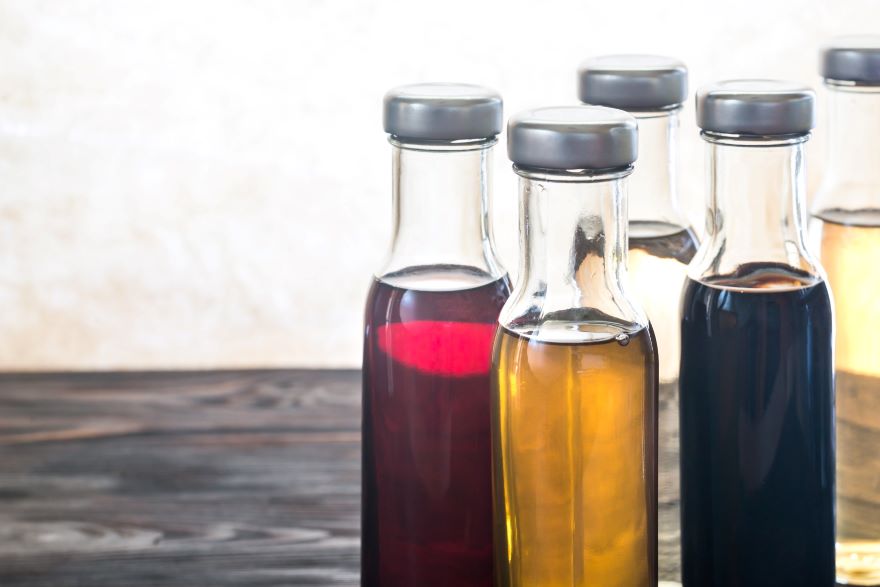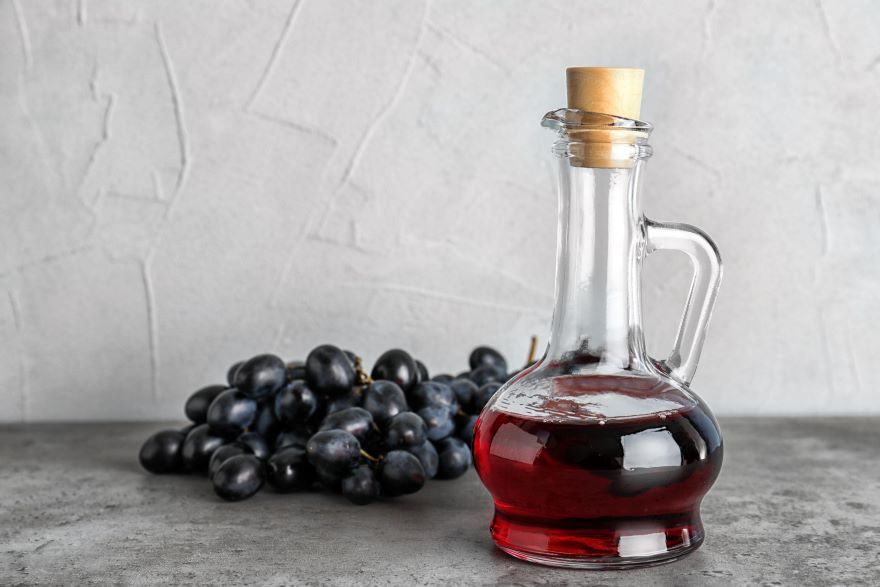Red wine vinegar is a common ingredient in many cuisines, known for enhancing the flavor of various dishes. It’s also a staple in numerous dressings and sauces. One question that often arises when talking about red wine vinegar is whether it contains any alcohol.
The primary process that makes red wine vinegar starts with fermenting red wine. During this fermentation process, the alcohol content in the original red wine gets converted into acetic acid. This acetic acid is what gives vinegar its characteristic sour taste. Although there may be traces of ethanol remaining in red wine vinegar, the alcohol content is significantly low, usually ranging from 0.1% to 2%.
Key Takeaways
- Red wine vinegar is made through a fermentation process which converts alcohol into acetic acid.
- The alcohol content in red wine vinegar is usually very low, between 0.1% and 2%.
- Red wine vinegar is an important ingredient in culinary applications, but its low alcohol content means it’s safe for use in most circumstances.
Understanding Red Wine Vinegar
When it comes to red wine vinegar, one might wonder if it contains alcohol and how it’s different from other types of vinegar. In this section, we’ll explore the production process of red wine vinegar, compare it to other vinegars, and discuss its alcohol content.
Production Process
The production of red wine vinegar involves a fermentation process where wine, containing ethanol, is exposed to acetobacter bacteria. This bacteria converts the ethanol into acetic acid, giving the vinegar its characteristic tangy flavor. Although the initial wine has a higher alcohol content, the fermentation process typically reduces it to less than 0.5%, making it safe for consumption without causing intoxicating effects.
Comparison to Other Vinegars

Red wine vinegar isn’t the only type of vinegar out there. For instance, balsamic vinegar is a popular Italian choice, known for its full-bodied, slightly sweet, and syrupy consistency. It’s often used in salads, sauces, and fruit desserts. Additionally, there’s white wine vinegar and cider vinegar, both of which serve unique flavor purposes in culinary dishes. However, it’s important to note that wine vinegars like red wine vinegar and white wine vinegar tend to have lower acidity levels compared to cider vinegar.
In conclusion, red wine vinegar does contain alcohol, albeit in small quantities. Its production process, unique tangy flavor, and low acidity levels make it a staple ingredient in many culinary dishes.
Alcohol Content in Vinegars
Role of Alcohol in Fermentation
When it comes to vinegar, many people wonder if there’s any alcohol content, especially in red wine vinegar. Well, we’re here to shed some light on this topic. The alcohol content in vinegar varies, but in general, it is quite low. This is because during the fermentation process, ethanol, the primary alcohol in alcoholic beverages, converts into acetic acid. As a result, there might be trace amounts of alcohol left in the vinegar, but it is usually no more than 0.1% to 2%.
The fermentation process plays a vital role in creating vinegar. It starts with an alcoholic liquid, like red wine, which then undergoes a two-step process. First, yeasts convert the sugars in the liquid into alcohol, generating ethanol. Next, specific bacteria called acetobacters convert this ethanol into acetic acid, giving vinegar its distinctive sour taste.
In red wine vinegar, the alcohol content can range from 0.1% to 2%. This trace amount of alcohol has little effect on a person’s capacity for intoxication and is considered non-alcoholic by most standards. It’s important to note, though, that the actual alcohol content in vinegar can vary based on factors like fermentation time and the starting alcohol content of the wine used.
So when it comes to red wine vinegar and other vinegars, the alcohol content is minimal and essentially negligible for intoxication purposes. While there might be tiny traces of alcohol, the fermentation process effectively converts the ethanol into acetic acid, making vinegars a safe and delicious ingredient for recipes that cater to a wide variety of dietary preferences and restrictions.
Red Wine Vinegar in Cooking
Culinary Uses
When it comes to cooking, we love using red wine vinegar in a variety of recipes. Its distinct sour flavor can enhance a wide range of dishes, from dressings and marinades to salads and even cooked meals. Thanks to the fermentation process it goes through, which turns the alcohol in red wine into acetic acid, red wine vinegar contains very little if any alcohol content, with levels typically ranging from 0.1% to 2%.
We often find red wine vinegar to be a perfect ingredient in salad dressings, as it adds a delightful tanginess and complexity to the mix. You can easily create a delicious vinaigrette by combining red wine vinegar with olive oil, salt, and pepper. Feel free to customize it by adding your favorite herbs and spices too!
When it comes to marinades, red wine vinegar works wonders in tenderizing and flavoring meats. Its acidity helps break down the proteins, while also imparting a rich taste that pairs well with various herbs and seasonings. Simply combine red wine vinegar with your choice of oil, herbs, spices, and other aromatics, then let your meat marinate for a few hours or even overnight.
In addition to dressings and marinades, we love using red wine vinegar to brighten up salads. A splash of red wine vinegar can bring out the flavors in a simple greens-based salad, or even a more substantial dish like a roasted root vegetable salad. Its acidity works well to balance out the natural sweetness of vegetables like carrots and beets.
So, the next time you’re in the kitchen, don’t hesitate to reach for the red wine vinegar. Its unique flavor and versatility make it an excellent addition to our repertoire of ingredients, whether it’s for dressings, marinades, or salads. Enjoy experimenting and discovering new ways to incorporate this tangy ingredient into your favorite recipes!
Choosing The Right Vinegar
When it comes to creating delicious dressings and marinades, the type of vinegar we choose can make a big difference in taste. In this section, we’ll explore the differences between commercial and homemade red wine vinegar, and how these variations can affect your culinary creations.
Brand Variations
Not all red wine vinegar brands are created equal. Some might offer a more tangy and robust flavor, while others could be on the milder side. It’s important for us to select a brand that suits our taste and complements the other ingredients in our dish.
Commercial red wine vinegar typically contains less than 0.5% alcohol, allowing it to be classified as non-alcoholic. However, we may find slight variations in alcohol content, taste, and tanginess between different brands. So, don’t hesitate to experiment with different options to find your favorite!
Homemade Red Wine Vinegar
If you’re interested in making your own red wine vinegar, you should consider some factors. Using grape juice or red wine to make homemade vinegar may result in a final product with a different alcohol content than its commercial counterpart. However, during the fermentation process, acetic acid bacteria convert most of the alcohol into acetic acid, resulting in a characteristically tangy flavor.
By making red wine vinegar at home, we have the opportunity to adjust the taste to our liking and even experiment with additional ingredients like lemon juice. Keep in mind, though, that it might take some trial and error to perfect the process and find the ideal flavor balance for our homemade vinegar.
In summary, whether we opt for a commercial brand or venture into making our own red wine vinegar, understanding the variations in taste, tanginess, and alcohol content can help us choose the right vinegar for our dressings, marinades, and culinary masterpieces.
Health Aspects of Red Wine Vinegar
Let’s explore the health aspects of red wine vinegar, amid recent buzz about it. First things first, is it safe for consumption? Absolutely! In fact, red wine vinegar boasts numerous health benefits that make it a great addition to your kitchen.
Red wine vinegar can lower blood sugar levels, which is beneficial for glucose monitoring. A study involving healthy adults who consumed red wine vinegar daily confirmed this ability. So, if you’re looking to keep your blood sugar in check, this vinegar might just be your new best friend!
For those wondering if red wine vinegar contains alcohol, worry not! Red wine vinegar has only trace amounts of alcohol, despite being made from fermented red wine. So, incorporating red wine vinegar into your meals and recipes is safe for those who prefer to avoid alcohol.
Another health aspect to consider is red wine vinegar’s acetic acid content. The conversion of alcohol to vinegar source creates acetic acid, the main component of vinegar. This compound is known for its various health benefits, such as promoting weight loss, lowering cholesterol levels, and improving digestion. So go ahead, splash some on your salads and let the good times roll!
In conclusion, red wine vinegar is not only safe to consume but also provides several health advantages. From helping maintain blood sugar levels to containing minimal alcohol content, it’s an excellent choice for a health-conscious pantry. So, let’s raise a toast (with vinegar, of course) to our well-being!
Conclusion
We’ve looked into the question of whether red wine vinegar contains alcohol. From our research, we can confirm that it does contain residual alcohol. Bacteria convert red wine alcohol into acetic acid during fermentation, giving vinegar its sour taste. However, the alcohol content in red wine vinegar is significantly low, usually ranging from 0.1% to 2%.
People generally consider red wine vinegar safe to consume. The trace amounts of alcohol in red wine vinegar should not concern those who avoid alcohol or have sensitivities. People have used red wine vinegar around the world for centuries as a versatile ingredient in various dishes.
In conclusion, red wine vinegar contains less than 0.5% ABV of trace amounts of alcohol. This makes it safe for consumption, even for people who avoid alcohol for various reasons. So, feel free to use red wine vinegar in cooking and enjoy its delicious flavor without worrying about alcohol content.
Frequently Asked Questions
- Is there any alcohol content in red wine vinegar? Yes, red wine vinegar does contain residual alcohol. Acetic acid bacteria convert red wine alcohol into acetic acid, giving vinegar its sour taste. However, the alcohol content in red wine vinegar is significantly low, usually ranging from 0.1% to 2%.
- Can red wine vinegar be consumed during pregnancy? Since red wine vinegar has a low alcohol content, people generally consider it safe to consume during pregnancy. However, we recommend consulting with your doctor or healthcare provider before consuming any food or beverage containing alcohol while pregnant.
- Does red wine vinegar require refrigeration? No, red wine vinegar does not require refrigeration. You can store it in a cool, dark place like a pantry or cupboard. Just make sure to keep it tightly sealed to preserve its flavor and quality.
- How long does red wine vinegar last before going bad? Red wine vinegar is relatively stable and has a long shelf life. An unopened bottle of red wine vinegar can last for around two to three years, while an opened bottle can be good for up to six months if stored properly.
- Is red wine vinegar halal for Muslims? While red wine vinegar may contain trace amounts of alcohol, the fermentation process transforms most of the alcohol into acetic acid. Many Islamic scholars consider the transformation process to be sufficient in making red wine vinegar halal since it is no longer considered an intoxicating substance. However, it is best to consult your local religious authority to confirm their stance on this issue.
- Can red wine vinegar affect an alcohol test result? The presence of residual alcohol in red wine vinegar is quite low, and it is unlikely to affect an alcohol test result. However, if you consume an unusually large amount of red wine vinegar right before taking an alcohol test, there could be a possibility of a false positive result. In general, it is best to avoid consuming any food or beverage with alcohol content before taking an alcohol test.

*We may earn a commission for purchases made using our links. Please see our disclosure to learn more.



